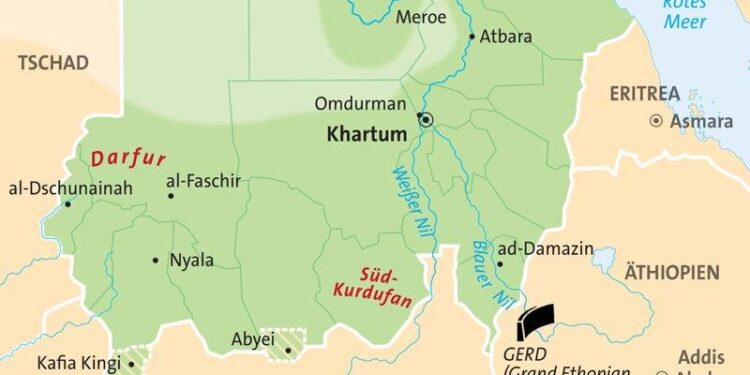Sudan’s Humanitarian Emergency: Escalating Conflict and Widespread Displacement
Sudan Faces Unprecedented Humanitarian Challenges Amid Rising Violence
The humanitarian landscape in Sudan has deteriorated dramatically as ongoing clashes intensify across multiple regions. The conflict has severely disrupted vital services, forcing millions to flee their homes and plunging the country into a deepening crisis. According to recent UN reports, nearly 24 million people, which accounts for almost half of Sudan’s population, are now in urgent need of assistance ranging from food and healthcare to shelter. The United Nations describes the situation as “catastrophic,” with fears mounting that continued hostilities will exacerbate already fragile living conditions.
In response, the UN World Food Programme (WFP) is scaling up its operations through several targeted interventions designed to meet immediate needs:
- Expanded Food Aid Distribution: Delivering increased quantities of food supplies to communities facing critical shortages.
- Cash Transfer Initiatives: Empowering families with financial resources to purchase essentials locally where markets remain operational.
- Nutritional Assistance Programs: Prioritizing vulnerable groups such as malnourished children and expectant mothers to reduce risks associated with starvation and illness.
| Aid Category | No. of Recipients | Status Update |
|---|---|---|
| Food Aid Distribution | 10 million | Ongoing Delivery |
| Cash Transfers | 5 million | Selecting Beneficiaries |
| Nutritional Support Services | 3 million | Active Implementation |
A Comprehensive UN Food Relief Campaign Tackles Growing Hunger Crisis in Sudan
The escalating instability in Sudan has severely impacted agricultural production, leading millions into acute hunger. In response, the United Nations has launched an extensive food relief campaign aimed at mitigating this dire shortage by coordinating closely with local partners for efficient aid delivery. This initiative encompasses several key components designed not only for immediate relief but also long-term resilience building:
- Rapid Emergency Food Supplies: Distributing essential rations swiftly to households most affected by conflict-induced scarcity.
- Targeted Nutrition Interventions: Focusing on high-risk groups including children under five years old and pregnant or breastfeeding women who face heightened vulnerability.
- Agricultural Livelihood Restoration: Supporting farmers through seed distribution programs and training aimed at reviving local food production capacities despite ongoing disruptions.
- Sustained Food Assistance: Despite expanded efforts by humanitarian agencies, demand still far outpaces supply capacity across many regions affected by conflict-related disruptions.
- Crisis Medical Provision: Health facilities are overwhelmed; shortages persist regarding essential medicines,surgical equipment,and trauma care supplies necessary for treating casualties.
- Cleansing Water Access & Sanitation: Safe drinking water remains scarce due both damaged infrastructureand overcrowded camps raising risksof waterborne diseases outbreaks requiring urgent mitigation measures.
This complex emergency necessitates a coordinated global response emphasizing three core areas:
- Diversified Funding Streams: Donor nations must expedite financial commitments ensuring sustained flowsof funds supporting frontline humanitarian operations.
- Efficacious Logistics Support:< b/> Enhanced transport capabilitiesare crucialfor delivering aid safelyinto remote or contested territories where access is often restrictedby insecurity.
- < b>Diplomatic Engagements Toward Peaceful Resolution:< b/> Parallel advocacy efforts should prioritize dialogue facilitation among conflicting parties aiming toward cessationof hostilities enabling safer environmentsfor aid deliveryand eventual recovery initiatives.
. . . . . . . . . . . . . . . . . . . . . . . . . . . . . . . . . . . . . . . . $ $ $ $ $ $ $ $ $ $ $ $ $ $ $ $ $ $ $ $ - - - - - - - - - - - - - - - - - - - -A Path Forward: Addressing Sudan’s Crisis Through Collective Action
The current turmoil engulfing Sudan represents one of the gravest humanitarian emergencies globally today—marked by escalating armed confrontations coupled with widespread displacement leaving millions vulnerable amid severe food shortages.The United Nations’ accelerated mobilization underscores an urgent call-to-action demanding robust international cooperation focused on alleviating human suffering while fostering pathways toward stability.Recent data highlights how timely intervention can save lives; however,the window narrows rapidly without enhanced global solidarity.Increased funding,dedicated logistical frameworks,and sustained diplomatic pressure remain indispensable components driving hopefor recovery amidst adversity.As observers worldwide monitor developments closely,the imperative grows stronger than everto unite behind those enduring hardshipin pursuitof peace,reconstruction,and renewed resilience throughout Sudan.
Recent military developments continue shaping dynamics on ground affecting civilian safety significantly.
Global attention remains fixed on regional conflicts influencing broader geopolitical stability. - Efficacious Logistics Support:< b/> Enhanced transport capabilitiesare crucialfor delivering aid safelyinto remote or contested territories where access is often restrictedby insecurity.
- Crisis Medical Provision: Health facilities are overwhelmed; shortages persist regarding essential medicines,surgical equipment,and trauma care supplies necessary for treating casualties.
| Program Component | Description | ||
|---|---|---|---|
| Basic Food Basket Delivery | Provision of staple foods such as grains, pulses, oil, salt. Ensures minimum caloric intake. | ||
| Community Participation | Engagement with tribal elders & community leaders to guarantee fair distribution & prevent diversion. | ||
| Impact Monitoring & Feedback Mechanisms | Continuous assessment of aid effectiveness and beneficiary feedback collection to refine future responses. | ||
An initial evaluation estimates that over 18 million individuals currently endure severe food insecurity across Sudan’s conflicted zones—a figure expected to rise without swift intervention. To address these challenges effectively, establishing secure humanitarian corridors remains critical for uninterrupted supply chains amid volatile security conditions.
The Urgent Need for Global Solidarity: International Calls Amplify Amidst Worsening Conditions
The worsening crisis in Sudan has galvanized international actors—governments, NGOs, and multilateral organizations—to amplify appeals for comprehensive support addressing multifaceted needs on the ground. The protracted violence continues triggering mass displacement while straining limited resources available within affected communities. Key priorities identified by UN agencies include:













